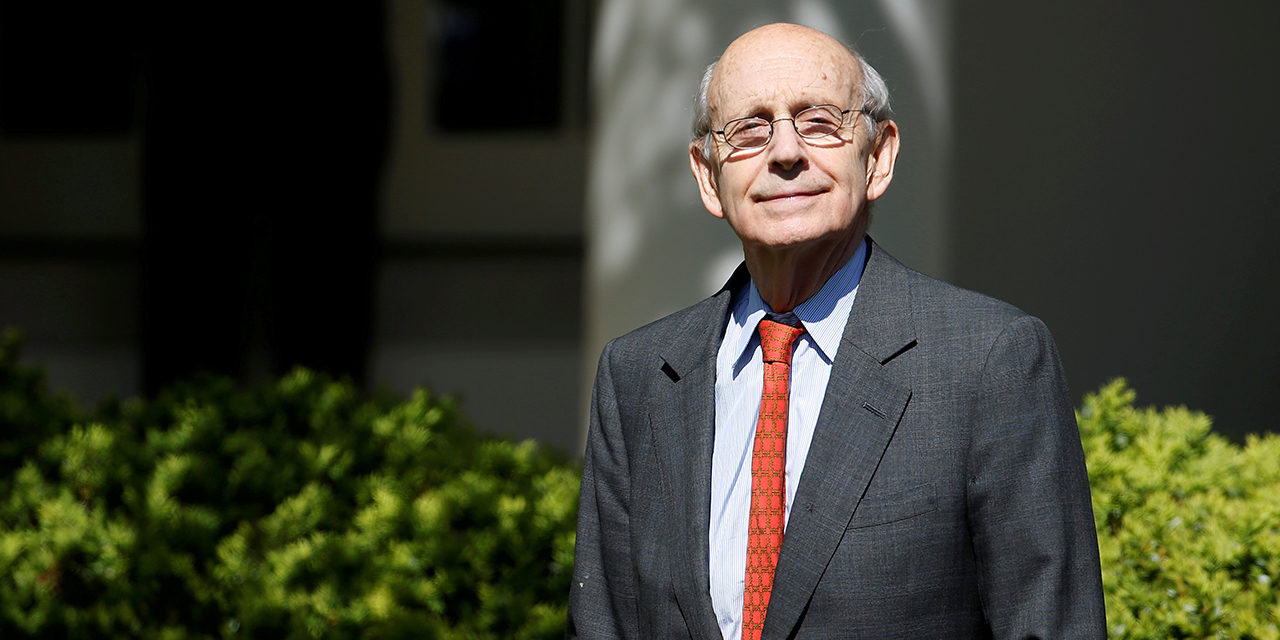U.S. Supreme Court Justice Stephen Breyer spoke to the Harvard University community this week for over two hours, touching on many subjects. Breyer, a former graduate of and professor at Harvard’s law school, included remarks warning against today’s political currents advocating for expanding the number of justices on the court in order to achieve liberal policy ends.
Worried that the court’s reputation is based on “a trust that the court is guided by legal principle, not politics,” according to The Washington Post, Breyer pointedly cautioned his audience against tinkering with the number of justices. “Structural alteration motivated by the perception of political influence can only feed that perception, further eroding that trust,” Breyer said.
The number of justices is not set by the Constitution, but left up to Congress, which set the current number at nine in 1869.
To back up his cautionary words, Breyer followed a line of reasoning that has been articulated by justices appointed by Democrats and Republicans alike: judges are not junior politicians. Or are at least not supposed to be.
“If the public sees judges as ‘politicians in robes,’ its confidence in the courts, and in the rule of law itself, can only diminish, diminishing the court’s power, including its power to act as a ‘check’ on the other branches,” he said.
Breyer acknowledged that presidents choose judges based on whether they have a liberal or conservative judicial philosophy, but argued that’s not the same as political ideology. For example, although many court observers like to say that there’s currently a 6-3 conservative majority on the court, the justice pointed to decisions of the court in the recent past which defied that characterization.
“[The court] did uphold the constitutionality of Obamacare, the health care program favored by liberals. It did re-affirm precedents that favored a woman’s right to an abortion. It did find unlawful certain immigration, census, and other orders, rules, or regulations, favored by a conservative president,” he said.
“At the same time it made other decisions that can reasonably be understood as favoring ‘conservative’ policies and disfavoring ‘liberal’ policies. These considerations convince me that it is wrong to think of the court as another political institution.”
For Christians, however, who have watched in frustration over the years as the nation’s high court decided social issues such as abortion, same-sex marriage and gender identity issues in ways that tend to defy the norms of constitutional and statutory interpretation, Breyer’s attempted distinction between judicial philosophy and political ideology can ring hollow.
As lawyers are fond of saying in such cases, that may be a distinction without a difference.
Yet Breyer is not incorrect in observing that our nation’s judicial system operates successfully only when the public trusts that court decisions reflect the rule of law, not the individual whims of the judges who decide those cases.
In the last Gallup poll on the subject done in 2020, the American public approved of the way the Supreme Court was doing its job, 53% to 43%. Since 2000, the court’s approval numbers have fluctuated from the low 40s to the low 60s.
However, the vast majority of those poll respondents are not graduates of the nation’s law schools, so they understandably base their opinions on a simpler rationale than an evaluation of the court’s legal expertise on display. Rather, they ask themselves: Do we “like” the court’s most recent results, or not?
Realistically, how could anyone expect them to do otherwise?
And therein lies the problem with public perception that Breyer and other justices, both liberal and conservative, have attempted to address over the years: the public tends to judge the court’s results in political terms. And many times that perception is reinforced by the decisions coming from the court, especially on social and political issues, where many times political ideology and judicial philosophy appear to line up so closely as to be indistinguishable.
The Supreme Court’s decisions can be frustrating at times for Christians, but we must continue to pray for a spirit of righteousness and wise judgment for those who serve as justices. We should also do what we can to ensure that future nominees to that high office exhibit an understanding not just of the law itself, but also of the boundaries the Constitution sets on their authority.
As Alexander Hamilton observed early in the constitutional process in Federalist No.78, the judiciary ought to be the “least dangerous to the political rights of the Constitution; because it will be least in a capacity to annoy or injure them.” If judges stay in their judicial lane, there will inevitably be fewer calls to “pack the court.”
Photo from Joshua Roberts/REUTERS






